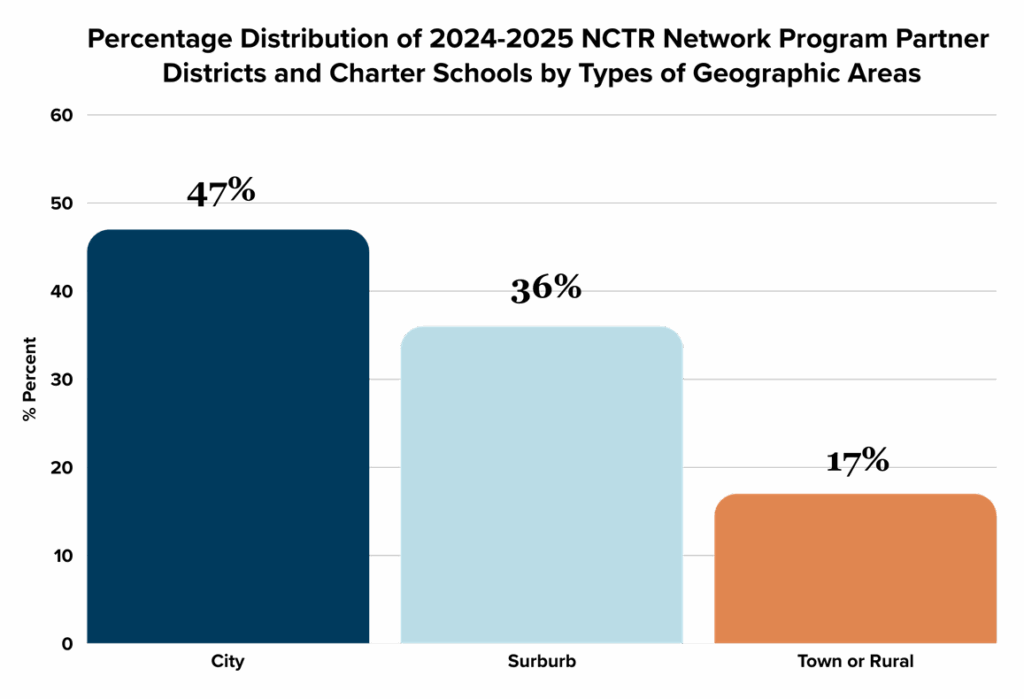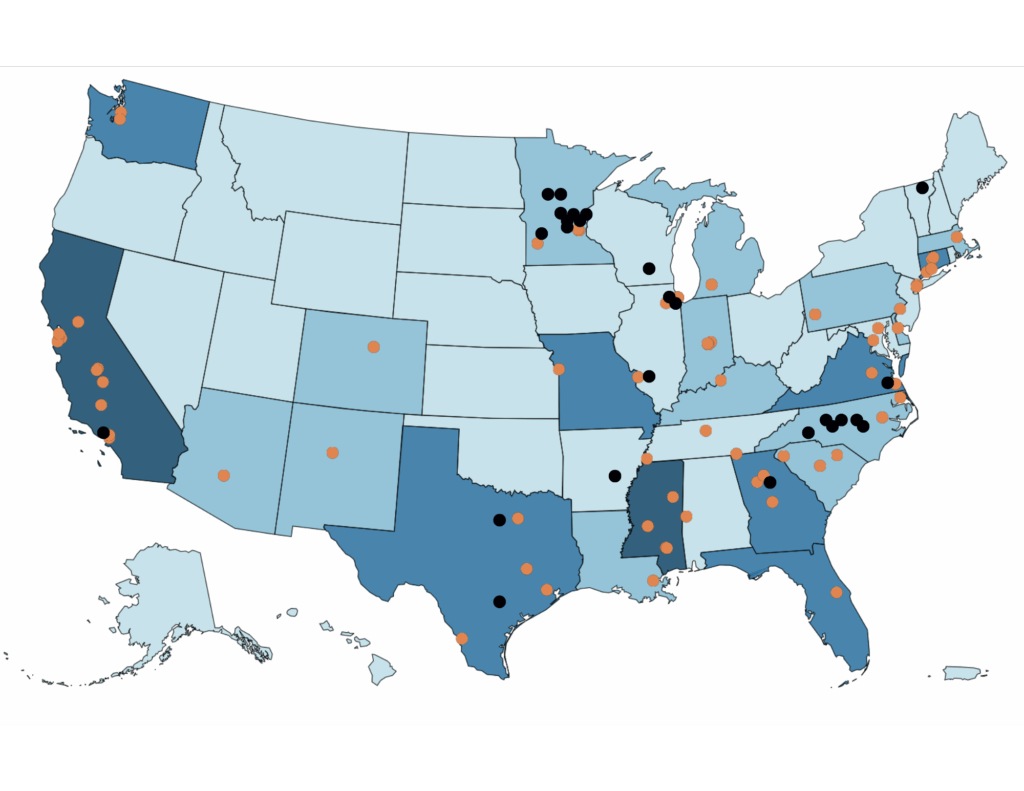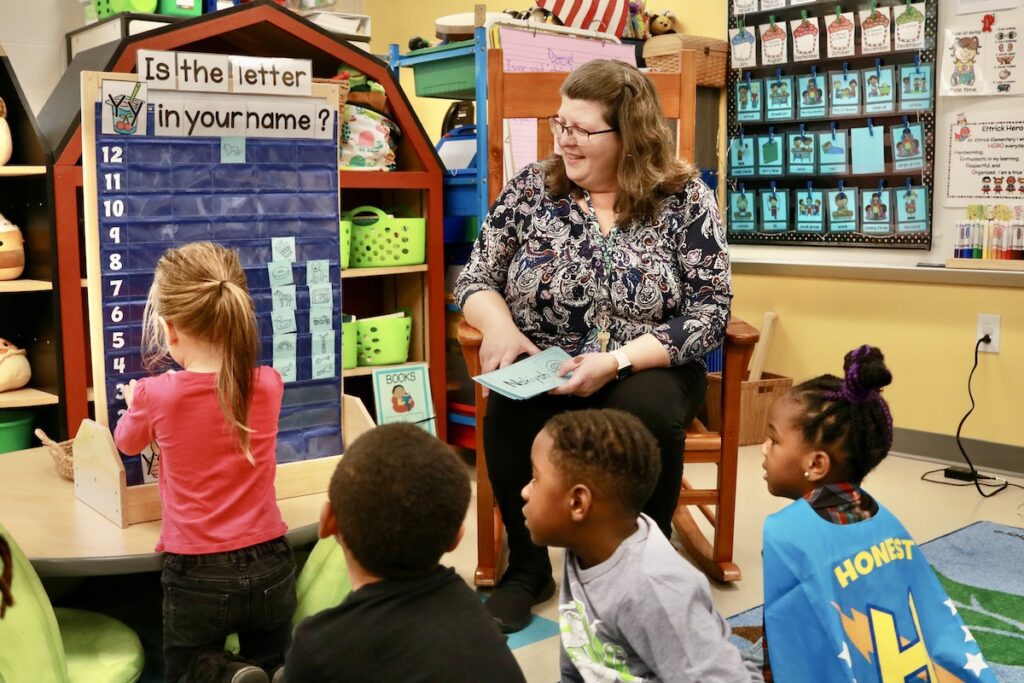Impact & Results
Teacher residencies are an innovative and transformative teacher preparation pathway.
0
0 %
0
0
Since 2007, NCTR has...
- Supported or helped launch over 125 teacher residency programs and teacher registered apprenticeship programs in 33 states
- Awarded grants to support 44 teacher residency programs for the recruitment and preparation of over 1,700 teacher residents through BEI
-
Supported the recruitment and preparation of more than 14,000 teacher residents of NCTR’s Network programs toward becoming teachers of record


Kanetha Lyke is a teacher resident and Devondra Barrett is a mentor teacher at the Chicago Public Schools Teacher Residency program. This picture was taken at Powell Elementary School.
The 2024-2025 NCTR Community At a Glance
24
Design teams composed of IHEs, school districts, state education agencies, and/or CMOs
25
Teacher residency programs or teacher registered apprenticeship programs designed and prepared to launch
10
States where RDA teams are located
65
NCTR Network members
75
Established teacher residency or registered apprenticeship programs
26
States, including Washington D.C.
661
School districts/CMOs
$5.8M
Grant funds awarded to BEI grantees for 2024-2025
31
Teacher residency programs received BEI grants
34
Established NCTR Network programs, and two newly designed residency programs supported
20
States where BEI grantees are located
- Residency Design Academy
-
24
Design teams composed of IHEs, school districts, state education agencies, and/or CMOs
25
Teacher residency programs or teacher registered apprenticeship programs designed and prepared to launch
10
States where RDA teams are located
- NCTR Network
-
65
NCTR Network members
75
Established teacher residency or registered apprenticeship programs
26
States, including Washington D.C.
661
School districts/CMOs
- BEI
-
$5.8M
Grant funds awarded to BEI grantees for 2024-2025
31
Teacher residency programs received BEI grants
34
Established NCTR Network programs, and two newly designed residency programs supported
20
States where BEI grantees are located
Strengthening the Impact of Teacher Residencies
With 65 Network members and 22 teams in Residency Design Academy (RDA), as represented in the map below with orange and black dots, respectively, NCTR Network programs partnered with over 650 districts and charter schools, the 2024-2025 NCTR community was one of the largest ever, exhibiting the continued growth of NCTR and the teacher residency movement. This year’s Network [along with the Boundless Educators Initiative (BEI)] and RDA collectively included nearly 100 established or soon-to-be-launched programs, with 16 of those being newly or soon-to-be registered apprenticeship programs. The NCTR community was composed of Network members and RDA teams located in 30 states, and 47% of Network member program partner districts and charter schools located in cities, 36% in suburbs, and 17% in towns or rural areas.


What Our Community Says
Preparing Teachers Who Represent and Value the Communities They Serve
NCTR’s data demonstrate how this year’s Network, as in previous years, continue to embody and support the achievement of NCTR’s mission and vision to prepare, support, and retain aspiring educators who represent and value the communities they serve.
Recruiting Educators Who Represent and Value the Communities They Serve

Susan Banchero is a teacher resident at RTR Teacher Residency. This picture was taken at Ettrick Elementary School.
“Through this program we are growing our own. [Residents] become embedded in the school culture as well as the expectations. They are able to form community relationships with families and students.”
NCTR Network Program Principal
Racial and Ethnic Demographics of NCTR Network Program Teacher Residents & Students in NCTR Network Program Partner Districts and Charter Schools

0 %
Preparing and Ensuring Students from Historically Underserved Communities Have Access to Effective Educators

of teacher residents of NCTR Network programs reported to feeling prepared or very well prepared
of graduates of NCTR Network member programs reported to feeling prepared or very well prepared
of mentors reported their teacher resident is prepared or very well prepared
of principals reported that residency graduates are more effective than a typical new teacher
Supporting the Retention of Educators to Create Lasting, Meaningful Change
“My program has supported and prepared me well for being a teacher by providing hands-on experience, targeted training, and consistent support focused on scholar success… Overall, my program gave me the confidence, tools, and real-world experience needed to become an effective teacher who puts scholars at the center of everything I do.”
NCTR Network Program Teacher Resident

Devontae Cash is a teacher resident at Alternative Pathways to Educator Certification (APEC) program at Coker University. This picture was taken at Chesterfield-Ruby Middle School.